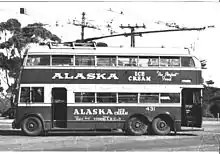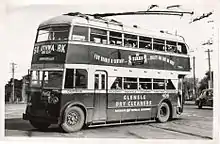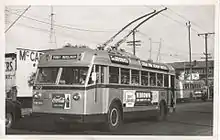Trolleybuses in Adelaide
The Adelaide trolleybus system formed part of the public transport network in Adelaide, South Australia from 1932 until 1963.
| Adelaide trolleybus system | |||||||||||
|---|---|---|---|---|---|---|---|---|---|---|---|
 Adelaide trolleybus no. 431, 1953. | |||||||||||
| Operation | |||||||||||
| Locale | Adelaide, South Australia | ||||||||||
| |||||||||||
| |||||||||||
History
During the Great Depression, Adelaide's Municipal Tramways Trust (MTT) needed to expand services, but finances prevented laying new tracks. A decision was made to trial trolleybuses, and a converted petrol bus began running experimentally on the Payneham to Paradise tram line during the off-peak on 18 May 1932. The trial concluded on 11 August 1934, with trams resuming operation.[1][2]
The trial was judged a success and the MTT planned its first permanent trolley bus line. In September 1937, the new service commenced from Light Square in the Adelaide city centre to Tusmore. In 1938, services commenced from Light Square to Port Adelaide, Semaphore and Largs Bay.[1]
In October 1952, the Linden Park tram line was converted followed by the Erindale line in May 1953. The trolleybus network closed in July 1963 replaced by motor buses.[3][1][2]
Fleet
Green Goddess
Petrol bus 216 was bodied by the Islington Railway Workshops as an open top bus on a Garford chassis in 1925. It was converted to a single deck trolleybus with rear platform and stairs removed and ran from May 1932 until August 1934. It was the first trolleybus in Australia and with a distinctive cream and green livery was known as "The Green Goddess". It seated twenty-three with room for twenty standing passengers. It was later used as a maintenance vehicle before being preserved by the Tramway Museum, St Kilda.[1][4][5]

AEC 661T
To operate the permanent services, 30 AEC 661T chassis were bodied by JA Lawton & Sons in 1937 and numbered 401 to 430. The double deckers seated fifty-seven with a crush load of eighty-four with all withdrawn by June 1957, a few briefly returning to service in August 1958.[1][4][5]
Leyland double deck
In 1942, the MTT bodied five Leyland chassis using JA Lawton & Sons components, entering service as 431 to 435. These double-deck, three-axle buses were the largest in the MTT fleet and remained so until withdrawn in 1958.[1][4] One was preserved by Trevor Tate before being sold to the Sydney Bus Museum in 1993.

Leyland Canton
26 Leyland chassis originally built for the Guangdong province in China, were purchased and bodied by the MTT between 1942 and 1945 and numbered 471 to 496. These single deckers had a seating capacity of thirty and a crush load of sixty. They became popularly known as cantons or wombats and remained in service until 1963. One has been preserved by the Tramway Museum, St Kilda.[1][4][5]
Sunbeam MF2B
In 1952/53, JA Lawton & Sons bodied 30 Sunbeam MF2B chassis. These single deckers seated forty passengers, had a crush load of seventy-seven and were used on services until mid-1963. Originally numbered 497 to 526, the first four were renumbered 527 to 530 in August 1958. One has been preserved by the Tramway Museum, St Kilda.[1][4][5]
Livery
The original livery was tuscan red and deep cream with black trim. The Sunbeams entered service in a new silver and carnation red livery. Except for the five 1942 Leyland double deckers, the rest of the fleet was repainted in this livery.[1]
See also
References
Notes
- Wheaton, RT (1975). Destination: Paradise. Sydney: Australian Electric Traction Association. pp. 42–50. ISBN 0 949825 01 8.
- Steele, Christopher (2014). Trolleys west. Elizabeth: Railmac Publications. p. 3. ISBN 9781864770988.
- The Tramway Museum, St Kilda (S.A.) (Undated), information brochure on tram fleets.
- The Adelaide tramways, pocket guide. A catalogue of rolling stock 1909–1974. Adelaide: Municipal Tramways Trust. 1974. p. 8.
- Trolleybuses Tramway Museum Adelaide
Further reading
- Australian Electric Traction Association. South Australian Branch (1962). The Facts about Trolleybus Operation in Adelaide. Tusmore, SA: Australian Electric Traction Association. South Australian Branch. OCLC 219956840.
- Jones, David (2000). Australian Trolley Buses : the trolley buses that once served Australian cities. Tawa, NZ: City Tramway Publications. ISBN 0-473-07118-5.
- McNicol, Steve (2016). Trolleys East: Adelaide's Trolleybuses in the Eastern Suburbs. Mini Profile Series, no. 6. Elizabeth, SA: Railmac Publications. ISBN 9781864771091.
- Municipal Tramways Trust (1974). Development of street transport in Adelaide: official history, 1907-1974. Adelaide: Municipal Tramways Trust. OCLC 216845730.
- Patton, Brian (2004). Double-Deck Trolleybuses of the World: beyond the British Isles. Brora, Sutherland: Adam Gordon. ISBN 978-1-874422-50-1.
- Radcliffe, J C; Steele, C J M (1974). Adelaide Road Passenger Transport 1836-1958. Adelaide: Libraries Board of South Australia. ISBN 0-7243-0045-7.
- Simpson, Margaret (2004). On the Move: A History of Transport in Australia. Sydney: Powerhouse Publishing. ISBN 978-1-86317-101-4.
- Smith, Neville S (1998). Tramcars, Trolleybuses in and around Port Adelaide, also Cheltenham Line. Adelaide: Australian Electric Transport Museum. OCLC 222763342.
- Steele, Christopher; Wheaton, Roger (1978). Adelaide on the Move 1878-1978: Public Transport in a Changing Scene. Sydney: Australian Electric Traction Association. ISBN 0-909459-04-5.
- Steele, Christopher (2014). Trolleys West: Adelaide's Trolleybuses in the Western Suburbs. Mini Profile Series, no. 4. Elizabeth, SA: Railmac Publications. ISBN 9781864771015.
External links
![]() Media related to Trolleybuses in Adelaide at Wikimedia Commons
Media related to Trolleybuses in Adelaide at Wikimedia Commons
